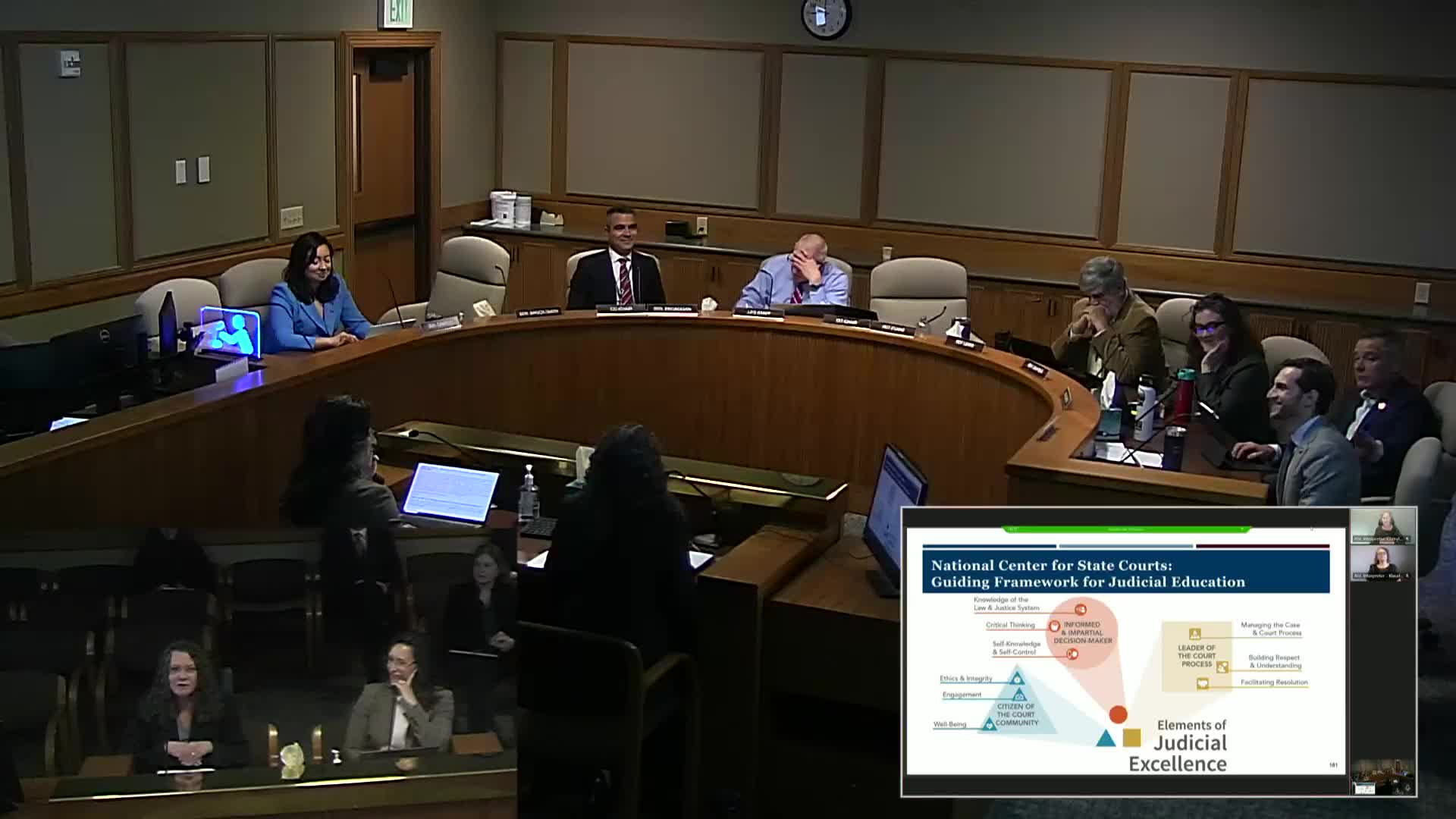Oregon Courts Seek $13.3M for Technology Upgrades and Staffing Support
February 26, 2025 | Public Safety, Ways and Means, Joint, Committees, Legislative, Oregon
This article was created by AI summarizing key points discussed. AI makes mistakes, so for full details and context, please refer to the video of the full meeting. Please report any errors so we can fix them. Report an error »

The Joint Committee on Ways and Means Subcommittee on Public Safety convened on February 26, 2025, to discuss critical funding proposals and operational needs for Oregon's court system. The meeting focused on enhancing caseflow management, upgrading technology, expanding pretrial programs, and addressing staffing shortages across various court functions.
The session began with a discussion on caseflow management, highlighting the need for judges to develop a broader skill set to improve court efficiencies. The proposal emphasized that effective caseflow management requires both legal knowledge and engineering principles, suggesting that additional training and resources could lead to better service delivery in the community.
A significant portion of the meeting was dedicated to a funding request of $13.3 million from the general fund aimed at upgrading outdated technology within the court system. This funding would cover network upgrades, software licensing, and maintenance costs for essential case management systems. The request also included $1.6 million for replacing aging equipment in Multnomah County, where over 5,000 assets are at risk of failure. The committee underscored that without these investments, courts could face operational disruptions and cybersecurity vulnerabilities.
The subcommittee also discussed the expansion of pretrial programs, which have been growing since a legislative investment in February 2021. The proposal seeks to add 19 new release assistance officers and two central analysts to enhance case management and explore electronic monitoring options, particularly for domestic violence cases. This expansion aims to reduce unnecessary pretrial detention while ensuring public safety.
Staffing needs were another focal point, with the committee noting that the courts are currently understaffed in key administrative roles. The budget proposal includes requests for additional analysts in budgeting, human resources, and internal auditing to ensure effective management of court operations and protect taxpayer dollars.
The meeting also addressed the increasing caseloads faced by the Oregon Tax Court and Court of Appeals, which have seen a 20% rise in filings since 2021. The courts are experiencing significant backlogs, and the committee discussed the need for additional resources to manage these demands effectively.
Behavioral health cases were highlighted as an area of growing concern, with a 35% increase in court hearings related to these matters. The proposal includes requests for more analysts to streamline case management and improve coordination with service providers.
Finally, the subcommittee reviewed funding requests for courthouse planning and improvements across several counties, totaling over $191 million. This funding is essential for addressing aging infrastructure and ensuring that courthouses can meet modern demands.
In conclusion, the meeting underscored the urgent need for investment in technology, staffing, and infrastructure to enhance the efficiency and effectiveness of Oregon's court system. The proposals discussed will be critical in addressing current challenges and improving access to justice for all Oregonians.
The session began with a discussion on caseflow management, highlighting the need for judges to develop a broader skill set to improve court efficiencies. The proposal emphasized that effective caseflow management requires both legal knowledge and engineering principles, suggesting that additional training and resources could lead to better service delivery in the community.
A significant portion of the meeting was dedicated to a funding request of $13.3 million from the general fund aimed at upgrading outdated technology within the court system. This funding would cover network upgrades, software licensing, and maintenance costs for essential case management systems. The request also included $1.6 million for replacing aging equipment in Multnomah County, where over 5,000 assets are at risk of failure. The committee underscored that without these investments, courts could face operational disruptions and cybersecurity vulnerabilities.
The subcommittee also discussed the expansion of pretrial programs, which have been growing since a legislative investment in February 2021. The proposal seeks to add 19 new release assistance officers and two central analysts to enhance case management and explore electronic monitoring options, particularly for domestic violence cases. This expansion aims to reduce unnecessary pretrial detention while ensuring public safety.
Staffing needs were another focal point, with the committee noting that the courts are currently understaffed in key administrative roles. The budget proposal includes requests for additional analysts in budgeting, human resources, and internal auditing to ensure effective management of court operations and protect taxpayer dollars.
The meeting also addressed the increasing caseloads faced by the Oregon Tax Court and Court of Appeals, which have seen a 20% rise in filings since 2021. The courts are experiencing significant backlogs, and the committee discussed the need for additional resources to manage these demands effectively.
Behavioral health cases were highlighted as an area of growing concern, with a 35% increase in court hearings related to these matters. The proposal includes requests for more analysts to streamline case management and improve coordination with service providers.
Finally, the subcommittee reviewed funding requests for courthouse planning and improvements across several counties, totaling over $191 million. This funding is essential for addressing aging infrastructure and ensuring that courthouses can meet modern demands.
In conclusion, the meeting underscored the urgent need for investment in technology, staffing, and infrastructure to enhance the efficiency and effectiveness of Oregon's court system. The proposals discussed will be critical in addressing current challenges and improving access to justice for all Oregonians.
View full meeting
This article is based on a recent meeting—watch the full video and explore the complete transcript for deeper insights into the discussion.
View full meeting
